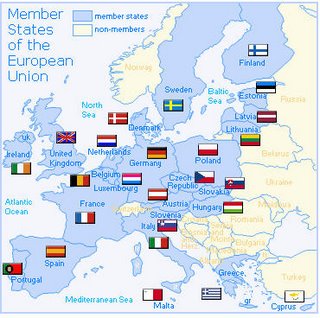 I take admittedly perverse delight in the public exasperation European leaders have been expressing lately over the failure of their former colonies in Africa, the Caribbean and the Pacific (ACP) to sign adhesive Economic Partnership Agreements (EPAs). Never mind that these agreements – as drafted – smack of little more than neo-colonial mercantilism.
I take admittedly perverse delight in the public exasperation European leaders have been expressing lately over the failure of their former colonies in Africa, the Caribbean and the Pacific (ACP) to sign adhesive Economic Partnership Agreements (EPAs). Never mind that these agreements – as drafted – smack of little more than neo-colonial mercantilism.But, notwithstanding many substantive reasons, my delight is informed by the ironical fact that ACP leaders are refusing to sign these EPAs for the same nationalistic reasons that European leaders are refusing to sign a comprehensive (and binding) EU Constitution.
Of course, one can be forgiven for having no clue that the heads of the 27 countries that comprise the European Union (EU) met in Portugal a few weeks ago, where they resurrected the constitution that European citizens voted DOA in 2005. After all, this political summit was arranged and executed with all of the stealth and feint one normally associates with a covert military operation.
But since then, instead of heralding this political miracle, EU leaders have been torturing language to assure their respective citizens that this constitution “is a very different document” from the one they summarily rejected.
At any rate, here’s the Eurosceptical tone I took in a June 2005 article entitled The EU Constitution is dead:
As I predicted…the French and now the Dutch have rejected the EU Constitution in resounding fashion. And even the most committed Europhile has to concede that this document will never come into force in Europe.Therefore, reasonable minds want to know why the putative Co-Presidents of Europe, Monsieur Chirac of France and Herr Schroeder of Germany, insist on issuing desperate pleas for other member states to “ratify” this dead turkey? (Sorry Turkey…)
 And nothing justifies my ‘eurocynicism’ quite like British Prime Minister Gordon Brown’s Sisyphean attempts to reconcile the contradictions inherent in this treaty. Because, according to the BBC, he proffered in recent parliamentary debates – without any hint of irony – that he had:
And nothing justifies my ‘eurocynicism’ quite like British Prime Minister Gordon Brown’s Sisyphean attempts to reconcile the contradictions inherent in this treaty. Because, according to the BBC, he proffered in recent parliamentary debates – without any hint of irony – that he had:…secured “special treatment for the UK in a range of areas” at the European summit and that Britain would keep opt-outs on foreign policy, labour rights, tax and social security.
But if Britain has already established the untenable precedent that it can “opt-out” of key provisions of the treaty, then what is the legal and substantive effect of this ersatz constitution?! And, apropos the impudence of its former colonies, is there any difference between Britain taking this approach to the EU Constitution and The Bahamas insisting that it will join the Caribbean Single Market Economy (CSME) only if it can opt out of key provisions of that regional treaty…?
Although, given the European pathology of dealing with conflicts by pretending they don’t exist, it is not surprising that all of the disagreements that doomed the original constitution remain extant. And most notable amongst these are issues concerning national farm subsidies, separation of powers between member states and the federal authorities in Brussels (i.e., the Council of the EU and the EU Commission); the power of Brussels to impose taxes (which fund the EU’s bloated budget) and the relative power of member states to affect EU legislation.

In fact, there seems to have been only one reform measure on the agenda when European leaders met in Portugal. And that was their strategic plan to eradicate the “democratic mandate to ratify the constitution by a referendum of the people” in favor of the more expedient process of pro forma ratification by national parliaments.
 But, to be fair, not all of them are being as disingenuous as Prime Minister Brown has been about their intent to break what British Opposition Leader David Cameron claims is “one of the most important manifesto commitments of all [namely] to let the people decide”.
But, to be fair, not all of them are being as disingenuous as Prime Minister Brown has been about their intent to break what British Opposition Leader David Cameron claims is “one of the most important manifesto commitments of all [namely] to let the people decide”.Indeed, it’s worth noting that former French President Valery Giscard d’Estaing, who headed the committee that drafted the original constitution, declared rather proudly that this reform treaty differs from that rejected constitution only “in approach rather than content”….
More to the point, however, d’Estaing betrayed the ostensible intent and undermined the practical value of the treaty by boasting that it was drafted by legal experts and is simply too “impenetrable for the public”. After all, it is patently absurd to ratify a constitution that only lawyers can relate to….
Meanwhile, member states have until 2009 to ratify this (re)incarnation of the EU Constitution. But I predict that it too will be rejected in resounding fashion – even by national parliaments.
Because I fully expect a popular backlash against this craven attempt by European leaders to finagle this document – full of legal and political jargon signifying nothing – into force. Not to mention that the Commission will probably be compelled to declare it null and void after member states follow the British precedent by systematically opting out of all provisions that do not suit their national interests.
Related Articles:
The EU Constitution is Dead!
The intractable obstacles to a United States of Europe
Failure of Caribbean countries to implement CSME
The Lisbon Treaty
The EU Constitution is Dead!
The intractable obstacles to a United States of Europe
Failure of Caribbean countries to implement CSME
The Lisbon Treaty
EU Treaty Constitution
Leave a Reply
You must be logged in to post a comment.